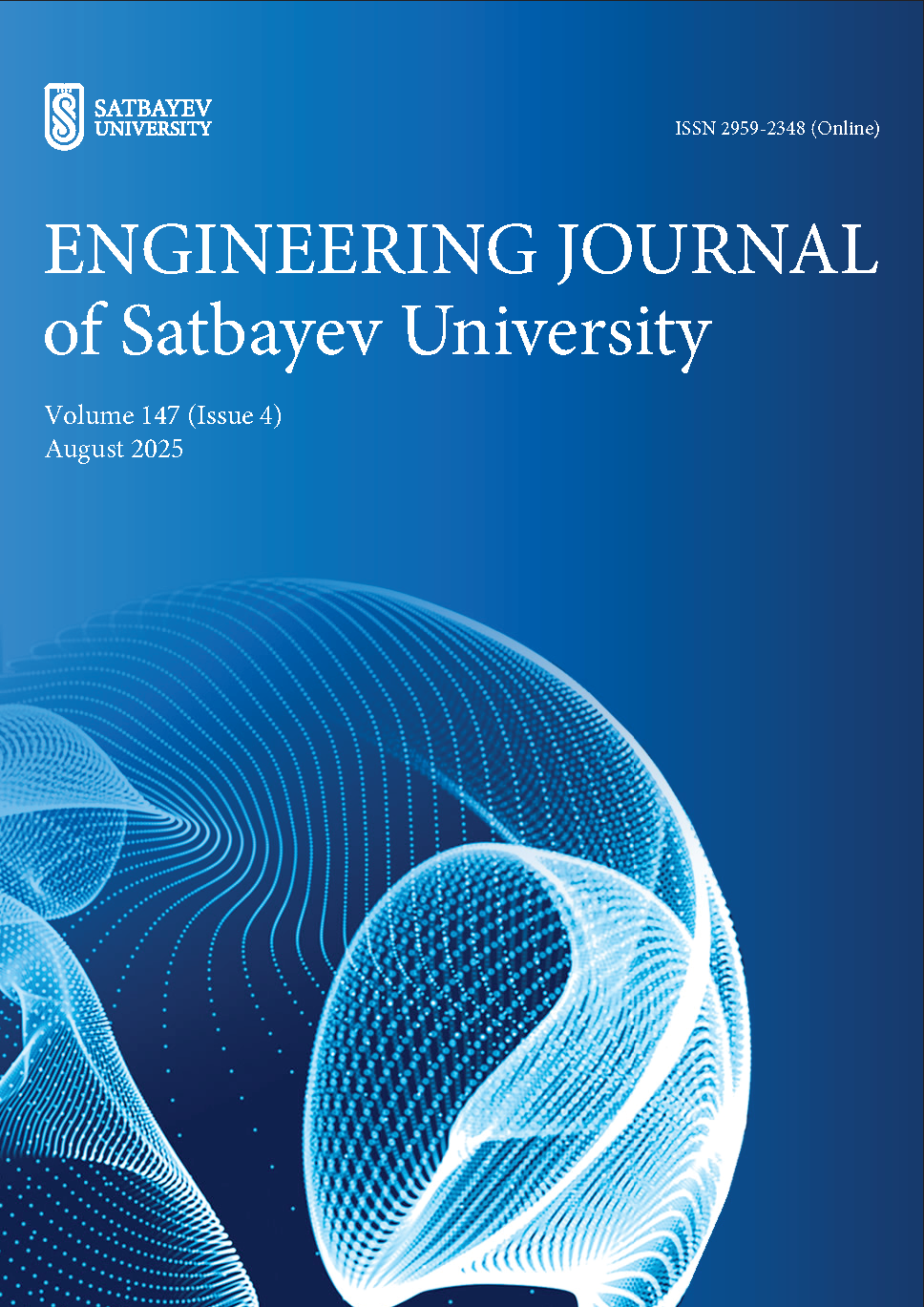Geodynamics of the Shu-Ile ore zone: integration of geophysical, geochemical and cosmogeological methods
DOI:
https://doi.org/10.51301/ejsu.2025.i4.05Keywords:
geodynamics, geophysical anomalies, ore-forming fluids, cosmogeological mapping, mantle plumesAbstract
The article presents the results of a comprehensive study of the Shu-Ile metallogenic zone using modern geophysical, geochemical methods and technologies of remote sensing of the Earth. The purpose of the study was to establish patterns of ore deposits within the zone based on new geodynamic approaches and the integration of multidisciplinary geological data. The relevance of the work is determined by the need to create sound predictive models of mineral deposits, including gold, polymetals and related elements, in conditions of a complicated geological situation and the exhaustion of lightly explored resources. During the research, data from gravimetry, magnetic surveying, electromagnetic sensing and remote sensing data, as well as geochemical characteristics of ore-bearing formations, were analyzed. These data were compared with the results of field observations, stratigraphic and tectonic constructions. A comprehensive analysis made it possible to identify zones of active interaction between the mantle and the earth's crust, manifested in the form of deep faults, subvertical conductive structures and tectonically weakened zones that play a key role in the formation of ore nodes. Based on a set of geophysical and geochemical features, a new approach to forecasting gold-sulfide and polymetallic mineralization is proposed. It involves modeling deep structures and assessing the degree of their influence on the surface manifestations of ore mineralization. The results obtained are of great practical importance: They can be used to optimize exploration activities, increase the efficiency of drilling programs, and minimize financial costs. The proposed methodology can be successfully applied in other metallogenic provinces of Central Asia, which emphasizes the versatility and practical significance of the work performed.
References
Pirajno, F. (2000). The Earth’s Internal Structure and Convec-tion in the Mantle. Ore Deposits and Mantle Plumes, 1-58. http://dx.doi.org/10.1007/978-94-017-2502-6_11
Baibatsha, A.B. (2020). Geotectonics and geodynamics of the paleozoics of Kazakhstan from the position of plume-tectonics. International Journal of GEOMAT, 19(71), 194-202. https://doi.org/10.21660/2020.71.31100
Baibatsha, A., Vyazovetsky, Y., Kembayev, M., Rais, S., & Agaliyeva, B. (2024). On the use of remote sensing data to study the geological structure and forecast mineral resources of the Shu-Ile suture. Mining of Mineral Deposits, 18(4), 56-70. https://doi.org/10.33271/mining18.04.056
Baibatsha, A.B. (2016). New geodynamic model of the develop-ment of the territory of Kazakhstan. International Geological Congress IGC-35, 194-203.
Baibatsha, A. (2017). Relationship of Paleozoides and Mineral Deposits of Kazakhstan with the Paleozoic Superplume. SGEM, 17(11), 479-486. https://doi.org/10.5593/sgem2017/11/S01.061
Dosmukhamedov, N., Kaplan, V., Zholdasbay, E., Argyn, A., Kuldeyev, E., Koishina, G., & Tazhiev, Y. (2022). Chlorination Treatment for Gold Extraction. Sustainability, 14(17), 11079. https://doi.org/10.3390/su141711019
Koshkin, V.Ya. (2008). Paleozoites of the western part of the Ural-Mongolian belt. Geology and Subsoil Protection, (3), 2-10
Potseluev, A.A., & Ananyev, Y.S. (2012). Remote sensing methods of geological research. Tomsk: STT
Yuen, D.A. Shigerenori, M., Shun-Ichiro, K. & Windley, B.F. (2007). Superplumes: Beyond Plate Tectonics. Netherlands, Springer
Chen, X., Qu, W., Han, S., Eleonora, S., Yang, N., Chen, Z., & Wang, Z. (2010). Re–Os geochronology of Cu and W–Mo de-posits in the Balkhash metallogenic belt, Kazakhstan and its geo-logical significance. Geoscience Frontiers, 1(1), 115-124. https://doi.org/10.1016/j.gsf.2010.08.006
C Chen, X., Wang, Z., Chen, Z., Seitmuratova, E., Han, S., Zhou, Q., & Ye, B. (2015). SHRIMP U–Pb, Ar–Ar and fis-sion-track geochronology of W–Mo deposits in the Balkhash Metallogenic Belt (Kazakhstan), Central Asia, and the geological implications. Journal of Asian Earth Sciences, 110, 19-32. https://doi.org/10.1016/j.jseaes.2014.07.016
Li, G., Cao, M., Qin, K., Evans, N.J., Hollings, P., & Seitmura-tova, E.Y. (2016). Geochronology, petrogenesis and tectonic settings of pre- and syn-ore granites from the W-Mo deposits (East Kounrad, Zhanet and Akshatau), Central Kazakhstan. Li-thos, 252-253, 16-31. https://doi.org/10.1016/j.lithos.2016.01.023
Joachim, R.R., & Christensen, U.R. (2007). Mantle Plums. Springer Science & Business Media
Shen, P., Pan, H.D., Seitmuratova, E. et al. (2016). U-Pb zircon and geochemical constraints on the Nurkazgan Cu–Au deposit in Kazakhstan. Journal of Asian Earth Sciences, (116), 232–248. https://doi.org/10.1016/j.jseaes.2015.11.018
Abdulin, A.A. (1980). Geology of the Shu-Ile region. Alma-Ata: Nauka
Zhao, D. (2009). Deep mantle plumes and their geological impli-cations. Earth and Planetary Science Letters, (287), 1-12
Gao, J., Klemd, R., Zhu, M., Wang, X., Li, J., Wan, B., Xiao, W., Zeng, Q., Shen, P., Sun, J., Qin, K., & Campos, E. (2018). Large-scale porphyry-type mineralization in the Central Asian metallogenic domain: A review. Journal of Asian Earth Scienc-es, 165, 7-36. https://doi.org/10.1016/j.jseaes.2017.10.002
Downloads
Published
How to Cite
Issue
Section
License
Copyright (c) 2025 Engineering Journal of Satbayev University

This work is licensed under a Creative Commons Attribution-NonCommercial-NoDerivatives 4.0 International License.
<div class="pkpfooter-son">
<a rel="license" href="http://creativecommons.org/licenses/by-nc/4.0/"><img alt="Creative Commons License" style="border-width:0" src="https://i.creativecommons.org/l/by-nc/4.0/80x15.png"></a><br>This work is licensed under a <a rel="license" href="http://creativecommons.org/licenses/by-nc/4.0/">Creative Commons Attribution-NonCommercial 4.0 International License</a>.
</div>





